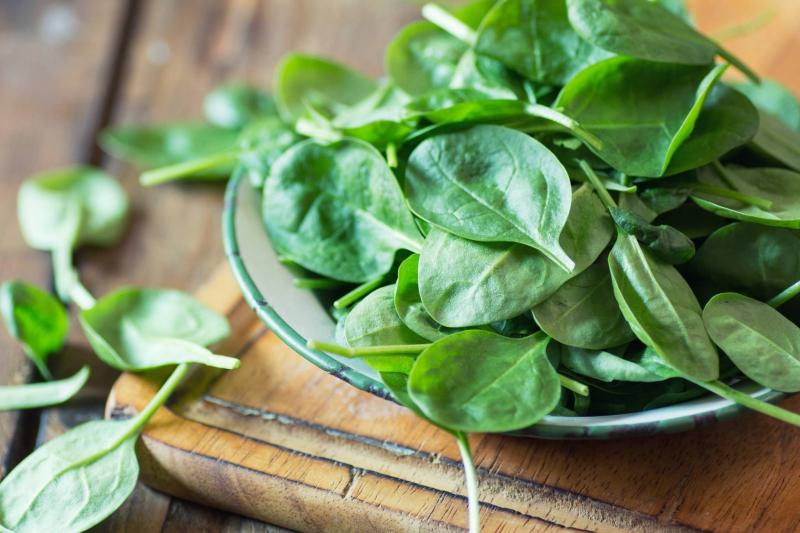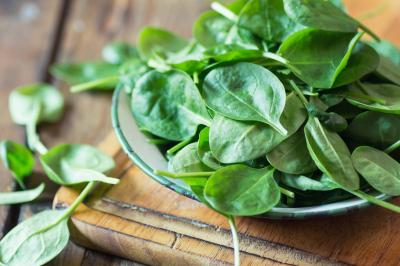Filling half your plate with vegetables is one of the simplest and most effective steps for weight loss, as vegetables are nutrient-dense and low in calories. According to the Eating Well website, calorie intake can be reduced while still providing essential nutrients to energize the body without suffering from deprivation or hunger through vegetable consumption. One cup of vegetables has low calories, high water content, and fiber, containing only 20 to 50 calories. In contrast, one cup of pasta or rice can contain around 200 calories. The report published on Eating Well clarifies that this does not mean carbohydrates have no place in the diet; rather, they can be included in limited amounts to keep calorie differences in check. To achieve better weight loss results while maintaining a healthy diet, the report identifies a number of vegetables that assist in weight loss as follows:
1. **Cauliflower**
One cup of chopped cauliflower contains 27 calories along with 2 grams of fiber and 2 grams of protein. Nutritionist Alicia Cartledge suggests that "the preferred way to prepare cauliflower is to chop it, drizzle it with a little olive oil, sprinkle garlic powder and nutritional yeast, then roast it in the oven until it’s browned and crispy around the edges." Alternatively, cauliflower rice can be made by blending chopped cauliflower in a food processor to achieve a rice-like texture, then "freezing it and using it in smoothies, soups, curries, and fried rice." Mukherjee mentions that cauliflower can be mixed with almost any dish due to its mild flavor, providing a calorie saving of 100 to 400 calories per meal.
2. **Spaghetti Squash**
Sheryl Musato, author of The Nourished Brain, states that "all types of winter squash are low-calorie foods effective for weight loss, but spaghetti squash is the ideal low-calorie substitute at only 42 calories per cup for anyone looking to reduce traditional spaghetti intake. It is low in fat and provides satisfying, nutritious fiber. For diabetics needing to limit carbohydrates, it does not spike blood sugar levels like pasta does."
3. **Avocado**
An avocado is high in healthy monounsaturated fats and contains about 10 grams of fiber, giving a feeling of fullness longer as it is digested slowly. Nutritionist Krista Brown states, "According to a recent study, eating half an avocado helps reduce total belly fat while providing heart-protective benefits by lowering harmful LDL cholesterol." A medium-sized avocado contains 240 calories.
4. **Cabbage**
Professor Jinan Bana states that "cabbage is low in calories and high in fiber, thus helping you stay full on few calories." One cup of cabbage contains only 22 calories and 5 grams of carbohydrates.
5. **Zucchini**
Functional medicine practitioner and nutritionist Anya Rosen mentions that zucchini contains fiber and nutrients "with very few calories." One cup of sliced zucchini has 20 calories and 3.5 grams of total carbohydrates.
6. **Romaine Lettuce**
When looking for one of the lowest calorie vegetables, romaine lettuce comes out on top with only 8 calories per cup. However, according to nutritionist Jennifer Fisc, "it should be noted that it has very little fiber, with only one gram per cup."
7. **Green Peas**
Green peas are starchy vegetables, meaning they contain more carbohydrates than non-starchy vegetables, but they are high in fiber and protein which is not as abundantly found in other vegetables. One cup of peas contains 8 grams of fiber and 8 grams of protein. In addition to fiber, protein promotes fullness, and high-protein diets help in weight loss.
8. **Kale**
One cup of kale has only 7 calories, meaning you can fill a plate with 4 to 5 cups of kale for less than 50 calories. Nutritionist Lisa Andrews notes that kale "has a tougher texture than other vegetables, which takes a little longer to chew, helping to promote a feeling of fullness when consuming fewer calories, leading to weight loss."
9. **Spinach**
Nutrition experts always recommend eating spinach for weight loss. Each cup of spinach contains 7 calories and 0.7 grams of fiber, making it an ideal meal for those seeking nutritional benefits and low calories.
10. **Carrots**
Professor Lisa Young, a nutrition expert, explains that carrots have slightly more sugar than other vegetables, but they are richer in fiber. One cup of carrots contains 3.5 grams of fiber, which is three times the amount of fiber in a cup of leafy vegetables. The calories in a cup of carrots do not exceed 50 calories in any case.
11. **Bell Pepper**
Nutritionist Kristi Gagnon states that "bell peppers are low in calories and high in nutrients. In fact, bell peppers contain more vitamin C than oranges!" She points out that higher body fat is linked to lower vitamin C levels in the diet. Research shows that people with adequate vitamin C levels burn 30% more fat during moderate exercise compared to those with lower vitamin C levels. One cup of raw bell pepper contains 24 calories with 2 grams of fiber.
12. **Broccoli**
Broccoli contains cancer-fighting compounds, especially sulforaphane and indole-3-carbinol. It is also rich in the antioxidant quercetin, which may help lower blood pressure. For weight loss, one cup of cooked broccoli has 5 grams of fiber, along with 3.5 grams of protein. Water makes up about 90% of broccoli, and it is abundant in vitamins C and K.




